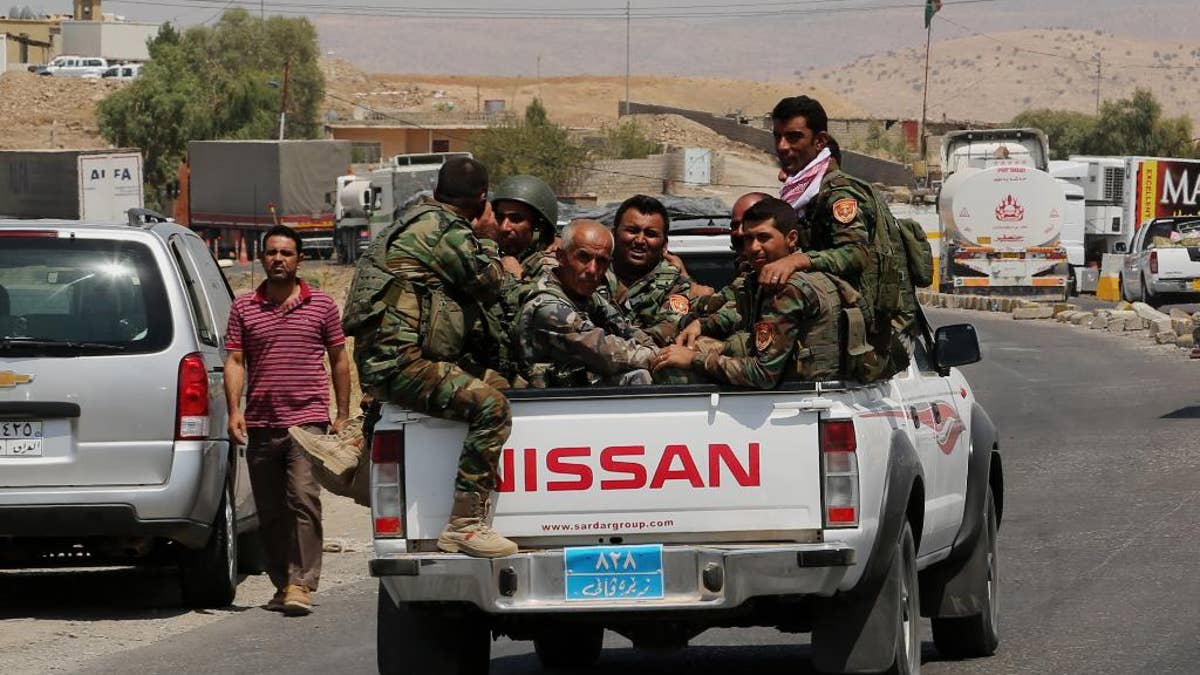
Kurdish forces, known as the Peshmerga, make their way to the front line to fight militants from the extremist Islamic State group at Mosul Dam, outside Mosul, Iraq, Monday, Aug 18, 2014. Boosted by two days of U.S. airstrikes, Iraqi and Kurdish forces on Monday wrested back control of the country's largest dam from Islamic militants, a military spokesman in Baghdad said, as fighting was reported to be underway for the rest of the strategic facility. (AP Photo/Khalid Mohammed) (The Associated Press)
IRBIL, Iraq – There suddenly are deep discounts available at the once-thriving gun bazaar in Irbil.
The price of an Austrian Glock pistol fell $500 to $3,000. An AK-47 is now $2,000, also down $500. And then there's another version of an AK-47 named "the Osama" after the late al-Qaida leader who famously preferred the model, now being sold for the bargain price of $2,700, down from $3,500.
Dealers say that sales of weapons at the market have slowed ever since the United States vowed to help Kurdish forces defend the largely autonomous region of northern Iraq from Islamic militants.
It's a rare vote of confidence in President Barack Obama in a region that has had a troubled relationship with Washington.
"People now don't worry because Obama decided to sell weapons to Kurdistan," dealer Sabir Bazalaky said at the bazaar, which sits in a dusty ditch near Irbil's main peach-colored prison.
A toothless old man watching nearby put it in simpler terms.
"Obama, Obama!" he hooted, using his hand to imitate a swooping aircraft.
Since the U.S. began conducting airstrikes on Aug. 8 against fighters of the Islamic State militant group, gun sales at the bazaar have flattened, and the dealers have cut their prices by a third or even a half.
The Sunni-led militants seized huge parts of northern and western Iraq in June for their self-styled Islamic State, although they mostly left Kurdish areas alone.
Then, in a surprise attack early this month, the extremists seized the Mosul Dam, villages around the Sinjar mountains in the north, villages near Irbil, and the Kurdish towns of Makhmour and Gweir. Tens of thousands of religious minorities feld to the safety of Kurdish-held areas.
Before the U.S. airstrikes, there was panic-buying at the gun bazaar. Kurdish men madly snapped up any weapons on offer, fearing the Islamic State fighters would roll into Irbil.
"They didn't even ask for the price, They just said, 'Please give me a gun,'" recalled dealer Alan Aly, 36, his eyes widening.
"This never happened before," added Aly, who like the other merchants sported an expensive Japanese gold watch.
Following the airstrikes, U.S. officials said they would begin weapons supplies to Kurdish forces, known as peshmerga. The move was broadly welcomed by the poorly armed Kurds, who have been distinctly pro-American since the 1990s, when earlier administrations protected them from Saddam Hussein's forces.
On a recent day, the market was quiet. Only a few customers milled about, quickly exchanging new dollar bills for guns. One man came with his pig-tailed little girls in tow, who looked around excitedly.
Aly did not have his weapons on display in the bazaar. He sells his pistols and rifles — even mortars and rocket-propelled grenade launchers — out of the back of his car.
The gun dealers were philosophical about the downturn in sales. All of them described themselves as patriots, listing the weapons they had donated to the peshmerga.
Aly said he had given them mortars and RPGs, and he laughed when asked to explain how he had gotten them.
Sitting in a friend's store, he looked at the M-16s, assault rifles and bullets displayed on a folding table. Could these weapons help the peshmerga stop the Islamic militants?
"No," he said with a smile. "We need tanks and helicopters."
